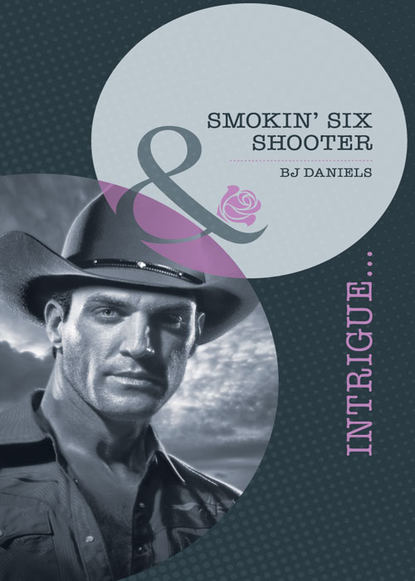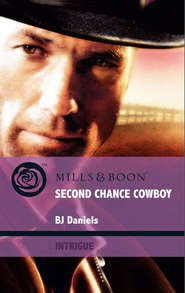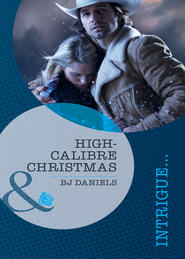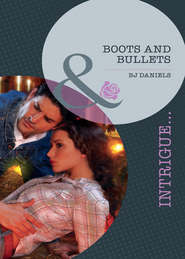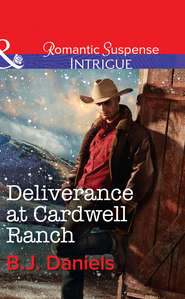По всем вопросам обращайтесь на: info@litportal.ru
(©) 2003-2025.
✖
Smokin' Six-Shooter
Автор
Год написания книги
2018
Настройки чтения
Размер шрифта
Высота строк
Поля
She blinked in surprise. The inside of the house was covered in dust, but it looked as if whoever had lived here had just walked out one day and not returned.
The furniture appeared to be right where it had been, including a book on a side table and a drinking glass, now filled with cobwebs and dust, where someone had sat and read. There were tracks where small critters had obviously made themselves at home, but other than that, the place looked as if it hadn’t been disturbed in years.
Since the murder?
Dulcie felt a chill and told herself the cowboy might have just made that up to scare her, the same way he had warned her about rattlesnakes.
According to the documents, Dulcie had been left the property twenty-four years before. She would have been four.
Who left property to a four-year-old?
Laura Beaumont apparently.
Dulcie drew back, brushed dust from her sleeve and started to turn to the rental car to leave when she heard a strange creaking groan that made her freeze.
What sent her pulse soaring was the realization that she’d heard this exact sound before. She found her feet and stepped around the side of the house to look in the direction the noise was coming from.
On top of the barn, a rusted weather vane in the shape of a horse moved in the breeze, groaning and creaking restlessly.
Dulcie stood staring at it, her eyes suddenly welling with tears. She had been here before. The thought filled her with a horrible sense of dread.
She wiped at the tears, convinced she was losing her mind. Why else did a pair of yellow curtains and a rusted weather vane make her feel such dread—and worse—such fear?
Chapter Three
Russell Corbett drove the combine down the road to where he’d left his four-wheeler. He hated trading the luxury of the cab of the combine with its CD player, satellite radio and air conditioner for the noisy, hot four-wheeler.
He much preferred a horse to a vehicle anyway, but he couldn’t argue the convenience as he started the engine and headed back toward Trails West Ranch.
As he neared the old Beaumont place, it was impossible not to think about the woman he’d almost crashed into earlier, sitting in the middle of the road. Fool city girl, he thought, shaking his head again. Thinking about her took his mind off the heat bearing down on him.
He hadn’t paid that much attention to her. Even now he couldn’t recall her exact hair color. Something between russet and mahogany, but then it had been hard to tell with the sunlight firing it with gold.
Nor could he recall the length, the way she had the weight of her hair drawn up and secured in the back. He idly wondered if it would fall past her shoulders should the expensive-looking clip come loose.
He did remember her size when he’d bent over her, no more than five-six or seven without those heels, and recalled the impression he’d gotten that while her body was slim, she was rounded in all the right places. He’d sensed a strength about her, or maybe it had just been mule-headed stubbornness, that belied her stature and her obvious city-girl background.
Realizing the path his thoughts had taken, Russell shook them off like water from a wet dog. He must be suffering from heatstroke, he told himself. No woman had monopolized his thoughts this long in recent memory.
He told himself he wasn’t even going to look as he passed to see if she was still parked in front of the old farmhouse as he passed. It was too hot to save her from herself, even if she had wanted his help.
But he did look and told himself it wasn’t disappointment he felt at finding her gone. It was relief that she wasn’t in some trouble he would have to get her out of.
He slowed the four-wheeler as he noticed the fence lying on the ground. With a curse, he stopped and got off to close it. The woman had a lot to learn about private property and leaving gates open, he thought.
Glancing at the house, he was glad to see that nothing looked any different. Not that the woman could do much damage to the place. No way could she have broken into the house—not with those manicured fingernails of hers.
He’d never paid much attention to the old Beaumont place, although he’d passed it enough times since the land just beyond it was Corbett property and seeded in dry-land wheat.
Standing next to the gate, he stared at the old house, recalling someone had told him there’d been a murder there and the house had been boarded up ever since. People liked to make houses seem much more sinister than they actually were, he thought. He was surprised he hadn’t heard rumors of ghosts.
But even if nothing evil lurked in that house, it made him wonder what the woman had found so interesting about the place since, from her surprised expression, she hadn’t known about the murder.
Hell, maybe she’d never seen an old farmhouse before.
As if he’d ever understood women, he thought, as he climbed back on his four-wheeler, just glad she hadn’t befallen some disaster. If all she’d done was leave the gate open then he figured no harm was done. By now, she would be miles away.
Still he couldn’t help but wonder what had brought her to his part of Montana in the first place. She certainly was out of her realm, he thought with a chuckle as he headed back to the ranch.
THE WHITEHORSE SEWING Circle was an institution in the county. Jolene had noticed that when the women who spent several days a week at the center making quilts were mentioned, it was with reverence. And maybe a little fear.
Clearly these women had the power in this community. Jolene got the impression that a lot of decisions were made between stitches and a lot of information dispersed over the crisp new fabric of the quilts.
It was with apprehension that she walked over to the center and pushed open the door. She’d been inside before for several get-togethers since she’d been hired as the community’s teacher. This was where all the wedding receptions, birthday and anniversary parties, festivals and funeral potlucks were held.
The wooden floors were worn from years of boots dancing across them. It was easy to imagine that hearts had been won and lost in this large open room. A lot of events in these people’s lives had been marked here from births to deaths and everything in between. If only these walls could talk, Jolene thought, wondering what stories they would tell.
As the door opened, sunlight pouring across the floor, the women all looked in her direction. They were gathered toward the back around a small quilting frame. A baby quilt, she realized, as she let the door close behind her.
“Hello,” Pearl Cavanaugh said, smiling her slightly lopsided smile. Pearl had had a stroke sometime back and was still recovering, Jolene had heard. Pearl’s mother had started the Whitehorse Sewing Circle years ago, according to the locals.
“I just thought I’d stop in and see what you were making,” Jolene said lamely. How was she ever going to get to her true mission in coming here?
She knew she had to be careful. For fear the story might stop, she didn’t want the author of the story to find out she’d been asking around about the murder.
“Please. Join us,” Pearl said.
The women looked formidable, eyes keen, but their expressions were friendly enough as she pulled up a chair at the edge of the circle and watched their weathered, arthritic hands make the tiniest, most perfect stitches she’d ever seen.
“The quilt is beautiful,” she said into the silence. She could feel some of the women studying her discreetly.
“Thank you,” Pearl said, clearly the spokeswoman for the group. Her husband, Titus, served as a sort of mayor for Old Town Whitehorse, preaching in the center on Sundays, making sure the cemetery was maintained and overseeing the hiring of teachers as needed.
“You have all met our new teacher, Jolene Stevens,” Pearl was saying. “She comes to us straight from Montana State University.”
“So this is your first teaching assignment,” a small white-haired, blue-eyed woman said with a nice smile. “I’m Alice White.”
“I recall your birthday party,” Jolene said. “Ninety-two, I believe?”
Alice chuckled. “Everyone must think I’m going to kick the bucket sometime soon since they’re determined to celebrate my birthday every year now.” She winked at Jolene. “What they don’t know is that I’m going to live to be a hundred.”
Jolene tried to relax in the smattering of laughter that followed. “This area is so interesting. I’m really enjoying the history.”
“I’m sure everyone’s told you about the famous outlaws who used to hide out in this part of the state at the end of the eighteenth century,” a large woman with a cherubic face said. Ella Cavanaugh, a shirttail relation to Pearl and Titus, as Jolene recalled. Everyone seemed to be related in some way or another.
“Butch Cassidy and the Sundance Kid as well as Kid Curry,” added another elderly member, Mabel Brown. “This part of the state was lawless back then.”
“It certainly seems peaceful enough now,” Jolene commented. “But I did hear something about a murder of a young widow who had a little girl, I believe?”





